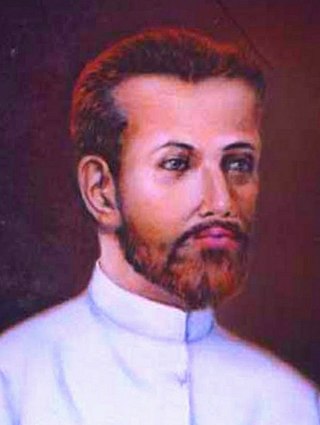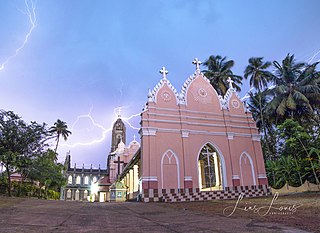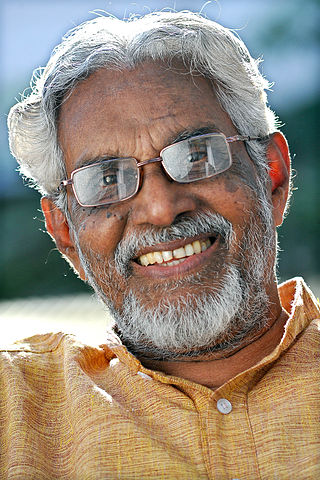Related Research Articles

Malayalam is a Dravidian language spoken in the Indian state of Kerala and the union territories of Lakshadweep and Puducherry by the Malayali people. It is one of 22 scheduled languages of India. Malayalam was designated a "Classical Language of India" in 2013. Malayalam has official language status in Kerala, Lakshadweep and Puducherry (Mahé), and is also the primary spoken language of Lakshadweep and is spoken by 35 million people in India. Malayalam is also spoken by linguistic minorities in the neighbouring states; with a significant number of speakers in the Kodagu and Dakshina Kannada districts of Karnataka, and Kanyakumari, Coimbatore and Nilgiris district of Tamil Nadu. It is also spoken by the Malayali Diaspora worldwide, especially in the Persian Gulf countries, due to the large populations of Malayali expatriates there. They are a significant population in each city in India including Mumbai, Bengaluru, Delhi, Kolkata, Pune etc. Malayalam is closely related to the Tamil language.

Malayalam, the lingua franca of the Indian state of Kerala and the union territories of Lakshadweep and Puduchery, is one of the six classical languages of India. Malayalam literature comprises those literary texts written in Malayalam, a South-Dravidian language spoken in the Indian state of Kerala. The first travelogue in any Indian language is the Malayalam Varthamanappusthakam, written by Paremmakkal Thoma Kathanar in 1785. Malayalam literature has been presented with 6 Jnanapith awards, the second-most for any Dravidian language and the third-highest for any Indian language.

Cochin Jews are the oldest group of Jews in India, with roots that are claimed to date back to the time of King Solomon. The Cochin Jews settled in the Kingdom of Cochin in South India, now part of the state of Kerala. As early as the 12th century, mention is made of the Jews in southern India by Benjamin of Tudela. They are known to have developed Judeo-Malayalam, a dialect of Malayalam language.
The Malayali people are a Dravidian ethnolinguistic group originating from the present-day state of Kerala in India, occupying its southwestern Malabar coast. They form the majority of the population in Kerala and Lakshadweep. They are predominantly native speakers of the Malayalam language, one of the six classical languages of India. The state of Kerala was created in 1956 through the States Reorganisation Act. Prior to that, since the 1800s existed the Kingdom of Cochin, the Kingdom of Travancore, Malabar District, and South Canara of the British India. The Malabar District was annexed by the British through the Third Mysore War (1790–92) from Tipu Sultan. Before that, the Malabar District was under various kingdoms including the Zamorins of Calicut, Kingdom of Tanur, Arakkal kingdom, Kolathunadu, Valluvanad, and Palakkad Rajas.

Johann Ernst Hanxleden (1681–1732), better identified as Arnos Pathiri, was a German Jesuit priest and missionary, best known for his contributions as a Malayalam and Sanskrit poet, grammarian, lexicographer, and philologist. He lived in India for most part of his life and became a scholar of Sanskrit and Malayalam languages before authoring Puthen Pana, a poem on the life of Jesus Christ, Malayalam–Portuguese Dictionary, the first dictionary in Malayalam as well as two linguistic treatises, Malayalavyaakaranam and Sidharoopam.
Joseph J. Palackal, C.M.I. is an Indic musicologist, singer and composer, with special interests in the musical traditions of the Indian Christians and a Syro-Malabar Catholic priest. He is also the Founder-President of the Christian Musicological Society of India.

St. Antony's Forane Church is a Syro-Malabar Catholic church and the first church in India named after St. Antony. It was founded in 883 AD. This church is one of the famous pilgrimage centers in Kerala. It is renowned for the feast of St. Joseph on March 19. The origin of Thattil family in Thrissur is linked with one of the army Chief of The King of Kochi. He was killed in a battle with Zamorin of Kozhikode at a place called Enamavu in Thrissur. As a mark of respect and memory of this great warrior, King promised to construct a church, where his body is buried. Accordingly, his body was buried in Pazhuvil in Thrissur and a church was constructed there. Thattil Clan, Which has its origin in the ancient Christian settlement of Pazhuvil Located in the western part of Thrissur District, 17 km from the city in the Thrissur-Thriprayar Road. By virtue of its nobility and culture this family finds an important place among the ‘Nazrani’-Thomas Christians of Kerala – families, legendarily claiming to be the descendants of those ancestors directly baptized by St. Thomas, one of the twelve Apostles of Lord Jesus Christ. Thattil Mapila who belonged to this clan and whose tomb is situated in the graveyard of Pazhuvil Catholic Church was built in the year 883 AD and catered to the spiritual needs of the Christians including those in Thrissur and its outskirts. Ollur is only one of the chapel of Pazhuvil Forane Church at that time. Arnos Padiri poem writer of Puthen pana buried here in1732. The tomb of Arnos Padiri is here.
Pazhuvil is a small village in Trissur district of Kerala state, south India. It is 17 km from Thrissur town, on the Cherpu - Triprayar road.

K. Ayyappa Paniker, sometimes spelt Ayyappa Panicker, was a Malayalam poet, literary critic, and an academic and a scholar in modern and post-modern literary theories as well as ancient Indian aesthetics and literary traditions. He was one of the pioneers of modernism in Malayalam poetry, where his seminal works like Kurukshethram (1960), is considered a turning point in Malayalam poetry. Many of Ayyappa Paniker's poems and his several essays were an important influence on later generations of Malayalam writers. His poems often reflected his deep concern for the environment with works such as Kadevide Makkale -Malayalam കാടെവിടെ മക്കളെ

D. Vinayachandran was an Indian Malayalam poet. He is one of the proponents of modern style of prose in Malayalam poetry. He was born in West Kallada, Kollam district and has worked as a Malayalam professor in various colleges for more than thirty years. He had his early education in schools in and around Kallada. After completing his master's in Malayalam literature from Government Sanskrit College, Pattambi, he entered the collegiate education service as a lecture and worked in various government colleges across Kerala. He joined the faculty of Mahatma Gandhi University, Kottayam, in 1991 and retired from University's School of Letters in 2006.

Believers Eastern Church is an Oriental Protestant Church of Indian origin with congregations and parishes worldwide. It is also a branch of the ministry Gospel for Asia. The church now follows an episcopal governance. The church holds Christ as the head of the Church but also requires that bishops and ordained ministers swear to submit to its metropolitan and any successors of the metropolitan. It is governed by a committee of bishops, the synod, with one central bishop holding the honorary title of "first among equals" and follows Evangelical Christian doctrine. Believers Eastern Church is administratively based in the state of Kerala in southwestern India. In 2015, the church reported it was re-organized into 33 dioceses; a decrease from the 36 dioceses reported by Smith in 2009. According to Believers Eastern Church, it claims its membership consists of more than 3.5 million people in 10 countries speaking a hundred languages. The Church has 30 bishops, and the Metropolitan Bishop is Moran Mor Athanasius Yohan Metropolitan.

Attoor Ravi Varma was an Indian poet and translator of Malayalam literature. One of the pioneers of modern Malayalam poetry, Ravi Varma is a recipient of Kendra Sahitya Akademi Award, Kerala Sahitya Akademi Award for Poetry and Kerala Sahitya Akademi Award for Translation, besides many other honours. The Government of Kerala honoured him with their highest literary award, the Ezhuthachan Puraskaram, in 2012 and the Kerala Sahitya Akademi inducted him as their distinguished fellow in 2017.

Manoj Kuroor is an Indian poet and lyricist who writes in Malayalam.

Poonthanam Nambudiri was a famous poet and a devotee of Guruvayurappan, who lived in Keezhattoor in what is now Malappuram district, Kerala, India. He is remembered for his masterpiece, Jnanappana which means "the song of divine wisdom" in Malayalam. His other chief poems in Malayalam are Bhasha Karnamritam and Kumaraharanam or Santanagopalam Pana. His other works include Raghaviyam, Vishnuvilasam and Sitaraghavam in Sanskrit and Vishnugeeta and Panchatantram in modern Malayalam.
Jnanappana is a devotional poem written by the 16th century Malayalam poet Poonthanam. This poem written as a devotional prayer to Guruvayoorappan is considered as an important work in Malayalam literature. Written in simple Malayalam, the Jnanappana was Poonthanam's magnum opus and is an important work of Bhakti literature from Kerala and is revered for its poetic merit and intensity of devotion.
Kristubhagavatam: A Mahakavya in Sanskrit based on the life of Jesus Christ is a Sanskrit epic poem on the life of Jesus Christ composed by P. C. Devassia (1906–2006), a Sanskrit scholar and poet from Kerala, India. For composing the Kristubhagavatam, Devassia won several awards, including the Sahitya Akademi Award for Sanskrit (1980). Composed in 1976 and first published in 1977, the poem consists of 33 cantos and over 1600 verses. Understood as a mahakavya, it represents the most prestigious genre of Sanskrit epic poetry, characterized by ornate and elaborate descriptions.

Puthussery Ramachandran Pillai was an Indian poet of the Malayalam language. He was a scholar of Dravidian linguistics and a professor of Malayalam for more than three decades. On 14 March 2020, he died of age-related illnesses.

Prabha Varma is a poet, lyricist, journalist and television presenter known for his works in Malayalam cinema. He has published ten collections of poems, three novels in verse, six books on the contemporary socio-political milieu and literature, six collections of essays in criticism, a study on media, a travelogue and a novel in english.

Vijayalakshmi is a Malayalam–language poet from the South Indian state of Kerala.

St. Michael's School, Kannur, officially St. Michaels Anglo Indian Higher Secondary School, Kannur, is a private Catholic primary and secondary school located in Kannur, in the state of Kerala, India. Founded by the Christian Brothers in 1865 and administered by the Society of Jesus since 1887, the school admits all castes and creeds but gives preference to Catholics. It includes nursery through higher secondary and prepares students for the state syllabus exams.
References
- ↑ "Arnos Padre commemoration". The Hindu . 17 March 2010. Archived from the original on 11 April 2013. Retrieved 18 March 2013.
- ↑ "Rich tributes paid to Arnos Padre". The Hindu . 21 March 2010. Archived from the original on 30 March 2010. Retrieved 18 March 2013.
- ↑ "Set Puthen Pana to new tunes: Minister". The Hindu. Retrieved 18 March 2013.
- ↑ ""Popular Indian Poems"".
- ↑ "Choreography on 'Puthenpana' staged". The Hindu . 22 January 2007. Archived from the original on 22 March 2008. Retrieved 18 March 2013.
- ↑ "The whole text of the PuthenPaana". Anto Jose. Retrieved 30 March 2013.[ permanent dead link ]